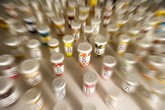Biosimilars/General
More discussion over WHO biological qualifier
The World Health Organization recently held its 59th Consultation on International Nonproprietary Names (INN) for Pharmaceutical Substances. At the meeting the issue of naming of biologicals including biosimilars was once again discussed.
ABPI issues updated position paper on biosimilars
On 14 May 2014, the association that represents innovative research-based biopharmaceutical companies in the UK, the Association of the British Pharmaceutical Industry (ABPI), issued the third edition of its position paper on biosimilars.
IAPO releases toolkit for biologicals and biosimilars
The International Alliance of Patients’ Organizations (IAPO), which comprises over 200 patient groups and represents the interests of patients worldwide, has published an Information and Advocacy Toolkit on Biological and Biosimilar Medicines for Patients’ Organizations. The Toolkit, published in November 2013, provides up-to-date, evidence-based information on the science, technology and regulatory information relevant to biologicals and biosimilars.
Call for action on labelling of biosimilars
European trade association, the European Association for Bioindustry (EuropaBio) has called on the European Medicines Agency (EMA) to define specific guidance on the labelling of biosimilars.
Biosimilars applications under review by EMA – August 2014
The European Medicines Agency (EMA) is the body responsible for approval of biosimilars within the European Union (EU). A legal framework for approving biosimilars was established in 2003. Approval of biosimilars is based on an abbreviated registration process, which allows biosimilars manufacturers to provide a reduced package of information compared to originator drugs, provided they can prove ‘similarity’ to the originator or reference drug.
FDA debuts purple book for biologicals and interchangeable biosimilars
On 9 September 2014, the US Food and Drug Administration (FDA) announced the publication of its first-ever edition of the ‘Purple Book’, a new set of lists of licensed biological products and interchangeable biosimilars that is meant to be the biological equivalent of the ‘Orange Book’, which lists pharmaceuticals and their generic equivalents.
US senators call for guidance on biosimilars
A growing number of US senators are calling on the country’s Department of Health and Human Services (HHS) and Food and Drug Administration (FDA) to release guidance on key scientific policy questions related to biosimilars.
WHO investigates use of a biological qualifier for biosimilars
The World Health Organization is still discussing several different options on how to name biosimilars, according to the recently published executive summary of its 57th Consultation on International Nonproprietary Names (INNs) for Pharmaceutical Substances.
Physicians believe biosimilars should have different names
In the ongoing debate over how to name biosimilars, US physicians have now added their opinion to the discussion.
WHO proposal offers clarity for biosimilar nomenclature
Following requests from drug regulatory authorities worldwide, the World Health Organization (WHO) has released a draft Biological Qualifier (BQ) proposal on which to base a globally recognized naming scheme for biological products, including biosimilars. According to the proposal, a four-letter code – the BQ – would be added after the INN.













